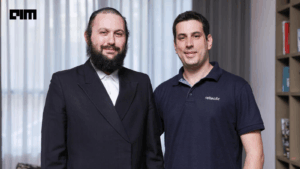Bevel, a New York-based health technology startup, has raised $10 million in Series A funding led by General Catalyst.
Founded by Grey Nguyen, Ben Yang, and Aditya Agarwal, the company has developed an AI-driven health companion that consolidates information from wearables, fitness trackers, sleep monitors, and nutrition apps into a single, personalized view.
The platform is designed to help users interpret how daily behaviors affect overall health. Nguyen, who founded Bevel after experiencing years of undiagnosed back pain, said the company’s purpose is to make health data meaningful and easy to understand. The funding will support product development, hiring, and expanded integration with existing health devices.
A Unified Approach to Personal Health
Nguyen started Bevel in 2023 after struggling to find useful insights from the devices and medical consultations he relied on. “Nothing pointed out what was actually causing my back pain, not even my doctors, which is crazy, right?” he said. That experience led to the creation of Bevel, a platform intended to unify the scattered landscape of personal health tracking.
The Bevel app connects to services such as Apple Health, Dexcom, and Libre, combining data from smartwatches, glucose monitors, and food tracking tools. Rather than presenting numbers in isolation, Bevel interprets patterns across metrics like sleep, nutrition, and physical activity. For instance, it maps how changes in eating or exercise habits influence rest and energy levels over time.
Bevel has more than 100,000 daily active users and an 80% retention rate over 90 days. Nguyen attributes this consistency to the app’s simplicity. “We think of health as a continuous journey, not a phase. Bevel meets you where you are, learns from your habits, and helps you make small changes that compound over time,” he said.
The company’s subscription model provides users with expanded analytics and individualised reports. It does not manufacture its own devices, relying instead on compatibility with existing wearables. This approach has allowed Bevel to reach users without requiring additional hardware purchases.
Addressing Fragmentation in Health Tracking
The digital health space has grown rapidly, but the abundance of apps and devices has left users managing multiple, often disconnected data sources. Bevel’s focus on consolidation responds directly to that issue. Its software creates a single view of health data that captures relationships between factors like diet, activity, and rest.
This data-first approach has given Bevel a foothold in a crowded sector. The company’s app is built to interpret correlations rather than issue medical guidance, serving as an interpretive layer between personal monitoring tools and professional healthcare. Nguyen said the goal is to help users better understand their daily health data, not to replace medical diagnosis or treatment.
Bevel’s engagement metrics suggest consistent user interaction. The company reports that users open the app an average of eight times a day, a figure that indicates strong retention in a market where user fatigue is common. The interface’s focus on context and clarity distinguishes it from fitness-focused tools that rely heavily on competitive or goal-based tracking.
Nguyen said Bevel’s development process is guided by transparency and responsible data use. The company has emphasized privacy protections as it expands integrations with new platforms. “People don’t need another tracker,” he said. “They need something that listens, interprets, and gives meaning to what they already track.”
Funding Signals Confidence in Data-Centric Health Tools
Bevel’s funding round comes at a time of heightened activity in the consumer health technology sector. As wearables and connected devices continue to generate growing volumes of user data, software companies are working to make that information coherent and accessible.
The company plans to use the funds to expand its engineering and data teams and refine its analytical capabilities. Bevel’s strategy is centered on software interoperability, allowing it to integrate with a range of third-party platforms rather than relying on proprietary systems. This approach has become increasingly relevant as health data becomes more complex and fragmented across devices and apps.
Unlike firms focused on diagnostic tools or enterprise health management, Bevel’s operations remain directed toward individual users. Its app functions as an interpretive interface for personal health tracking, giving users access to connected insights drawn from everyday behavior. Bevel stays within a consumer segment that is already accustomed to digital self-tracking by structuring the product around existing wearables.
The company’s current priorities include expanding its technical infrastructure, improving the accuracy of its analytics, and strengthening partnerships with health-device makers to ensure better data reliability. Nguyen said the goal is to maintain the app’s focus on simplicity while broadening its reach









